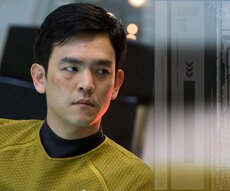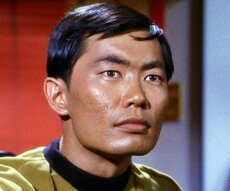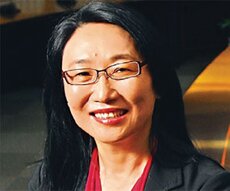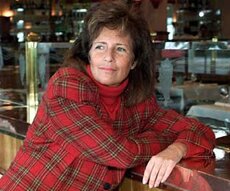 When Pine landed the role of James T. Kirk in J. J. Abrams’s 2009 Star Trek reboot, he wrote the USS Enterprise’s first captain, William Shatner, to explain “who this punk kid was taking over for him.” That self-deprecating nature has stayed with the rising star, even as the film’s sequel — hailed by the Washington Post “as a triumph of casting” — hits theaters. Balancing respect for Shatner’s historic portrayal with making the part his own, Pine said, “The first thought is always don’t screw it up.” Like fellow Bear and crewmate John Cho ’96, Pine didn’t catch the acting bug until he was an English major at Cal, despite his Hollywood roots. He grew up in a house where his father, a veteran film and television actor, “had good years and lean years.” But for the younger Pine, 2013 will be a very good year. He’ll soon swap out his yellow shirt and spacecraft for black threads and a motorcycle in the title role of Jack Ryan, Tom Clancy’s beloved CIA analyst, releasing this December.
When Pine landed the role of James T. Kirk in J. J. Abrams’s 2009 Star Trek reboot, he wrote the USS Enterprise’s first captain, William Shatner, to explain “who this punk kid was taking over for him.” That self-deprecating nature has stayed with the rising star, even as the film’s sequel — hailed by the Washington Post “as a triumph of casting” — hits theaters. Balancing respect for Shatner’s historic portrayal with making the part his own, Pine said, “The first thought is always don’t screw it up.” Like fellow Bear and crewmate John Cho ’96, Pine didn’t catch the acting bug until he was an English major at Cal, despite his Hollywood roots. He grew up in a house where his father, a veteran film and television actor, “had good years and lean years.” But for the younger Pine, 2013 will be a very good year. He’ll soon swap out his yellow shirt and spacecraft for black threads and a motorcycle in the title role of Jack Ryan, Tom Clancy’s beloved CIA analyst, releasing this December.
 Following a path from Korea to Cal to the final frontier, Cho practically stumbled into acting as a Berkeley English major when he spontaneously filled in for an actor who had dropped out of a play. Today he is one of the most popular Asian American actors of his generation. Cast in comedies when “people didn’t think Asians could do comedy,” he counts the American Pie and Harold and Kumar series among his credits. His latest undertaking has been reprising the iconic Sulu in the films Star Trek (2009) and Star Trek Into Darkness (2013). George Takei, the first Sulu and Cho’s hero, lured him into the series as a kid. “When you’re switching the channels and you see someone who looks like you, you freak out,” he said. A quote in his IMBD profile said he wasn’t interested in splashy debuts, but rather “sustaining a career, because that’s what’s truly difficult.” Let’s hope Cho is just getting started. Follow him on Twitter @JohnTheCho.
Following a path from Korea to Cal to the final frontier, Cho practically stumbled into acting as a Berkeley English major when he spontaneously filled in for an actor who had dropped out of a play. Today he is one of the most popular Asian American actors of his generation. Cast in comedies when “people didn’t think Asians could do comedy,” he counts the American Pie and Harold and Kumar series among his credits. His latest undertaking has been reprising the iconic Sulu in the films Star Trek (2009) and Star Trek Into Darkness (2013). George Takei, the first Sulu and Cho’s hero, lured him into the series as a kid. “When you’re switching the channels and you see someone who looks like you, you freak out,” he said. A quote in his IMBD profile said he wasn’t interested in splashy debuts, but rather “sustaining a career, because that’s what’s truly difficult.” Let’s hope Cho is just getting started. Follow him on Twitter @JohnTheCho.
Arts and Entertainment
 Best known for playing Sulu on the original “Star Trek” TV series and the six movies that followed, Takei is unlikely social media royalty. Unofficially dubbed the King of Facebook, he counts 4 million fans in his online empire — including “Trekkies,” Howard Stern listeners, and the LGBTQ community — who devour his quirky mix of kitten jokes, “Star Trek” references, heartfelt messages, and sci-fi/fantasy memes. An outspoken advocate for civil rights, Takei has used his unmistakable baritone in several satiric PSAs, including one in response to Tennessee’s infamous “Don’t Say Gay” bill that encourages viewers to say, “It’s okay to be Takei.” His current projects include the musical Allegiance, drawn from his experience of growing up in a Japanese-American internment camp during World War II, and the recently published Oh Myyy! There Goes the Internet. Follow the king’s rule on Facebook or Twitter @georgetakei.
Best known for playing Sulu on the original “Star Trek” TV series and the six movies that followed, Takei is unlikely social media royalty. Unofficially dubbed the King of Facebook, he counts 4 million fans in his online empire — including “Trekkies,” Howard Stern listeners, and the LGBTQ community — who devour his quirky mix of kitten jokes, “Star Trek” references, heartfelt messages, and sci-fi/fantasy memes. An outspoken advocate for civil rights, Takei has used his unmistakable baritone in several satiric PSAs, including one in response to Tennessee’s infamous “Don’t Say Gay” bill that encourages viewers to say, “It’s okay to be Takei.” His current projects include the musical Allegiance, drawn from his experience of growing up in a Japanese-American internment camp during World War II, and the recently published Oh Myyy! There Goes the Internet. Follow the king’s rule on Facebook or Twitter @georgetakei.
 Despite hardships growing up in El Salvador, Broz showed an insatiable hunger for learning that has defined her entire life. She immigrated to San Francisco in 1943, eventually graduated from Berkeley, and became a teacher in California. After retiring in the late 1980s, she decided to give back to the country “that shaped my soul.” At age 65 — amidst a raging civil war — she started a school under the trees in the conflict-ridden community of El Barío. Drawing support from her Quaker community, including money for books, uniforms, and computers, the El Salvador Projects (the program’s current name) has opened more schools serving some of the country’s poorest children and expanded its focus to sending the very brightest students to college. Perhaps contemplating the difference one person can make, Broz wrote in a poem, “I thought I was a speck of dust dancing along a ray of sun. I thought I was a child of chance. But now I know I am as wide, as brown, as warm as the earth, mother of all, and the sun’s mate.” Read more about Broz, or follow the project on Facebook.
Despite hardships growing up in El Salvador, Broz showed an insatiable hunger for learning that has defined her entire life. She immigrated to San Francisco in 1943, eventually graduated from Berkeley, and became a teacher in California. After retiring in the late 1980s, she decided to give back to the country “that shaped my soul.” At age 65 — amidst a raging civil war — she started a school under the trees in the conflict-ridden community of El Barío. Drawing support from her Quaker community, including money for books, uniforms, and computers, the El Salvador Projects (the program’s current name) has opened more schools serving some of the country’s poorest children and expanded its focus to sending the very brightest students to college. Perhaps contemplating the difference one person can make, Broz wrote in a poem, “I thought I was a speck of dust dancing along a ray of sun. I thought I was a child of chance. But now I know I am as wide, as brown, as warm as the earth, mother of all, and the sun’s mate.” Read more about Broz, or follow the project on Facebook.
Education, Public Service and Activism
 From humble beginnings in Mexico, Quiñones-Hinojosa hopped the fence into the United States at age 19 to seek a better life — and has been breaking boundaries ever since. A world-renowned neurosurgeon and researcher at Johns Hopkins University, Dr. Q, as he is known today, started off as a fieldworker in central California but refused to accept this as fate. He eventually received a scholarship to Berkeley, where he majored in psychology, then graduated cum laude from Harvard with a medical degree. Today he performs nearly 250 surgeries a year and researches neural stem cells to understand how brain cancer originates and spreads. In a 2008 Nova story, Dr. Q said, “The odds are overwhelmingly against me succeeding in this field, as far as finding a cure or a better way to treat brain cancer. But so were the chances of me sitting here with you.” His recent memoir, Becoming Dr. Q, testifies to the power of dreams, determination, and believing in people’s potential, regardless of their class or race. Find Dr. Q on Facebook or YouTube.
From humble beginnings in Mexico, Quiñones-Hinojosa hopped the fence into the United States at age 19 to seek a better life — and has been breaking boundaries ever since. A world-renowned neurosurgeon and researcher at Johns Hopkins University, Dr. Q, as he is known today, started off as a fieldworker in central California but refused to accept this as fate. He eventually received a scholarship to Berkeley, where he majored in psychology, then graduated cum laude from Harvard with a medical degree. Today he performs nearly 250 surgeries a year and researches neural stem cells to understand how brain cancer originates and spreads. In a 2008 Nova story, Dr. Q said, “The odds are overwhelmingly against me succeeding in this field, as far as finding a cure or a better way to treat brain cancer. But so were the chances of me sitting here with you.” His recent memoir, Becoming Dr. Q, testifies to the power of dreams, determination, and believing in people’s potential, regardless of their class or race. Find Dr. Q on Facebook or YouTube.
 Lured into acting while a pre-med student at Berkeley, Peck was so poor as a young actor in New York that he often slept in Central Park. Little did he anticipate that he would become one of the greatest movie figures of all time. Known for characters who personified bravery and kindness, Peck is primarily remembered for his Oscar-winning portrayal of Atticus Finch — a Southern lawyer defending a black man accused of rape — in the classic To Kill a Mockingbird. He swept Audrey Hepburn off her feet in Roman Holiday, confronted anti-Semitism in Gentleman’s Agreement, and teamed up with Alfred Hitchcock in Spellbound, among numerous unforgettable roles. A staunch supporter of liberal causes, Peck was awarded the Presidential Medal of Freedom, the nation’s highest civilian honor, in 1969. Approaching age with dignity, he was quoted in the LA Times obituary as saying: “I’m aware it’s autumn. But I’m not bothered. … I love my work and my wife and my kids and my friends. And I think, ‘You’re a lucky man, Gregory Peck, a damn lucky man.’”
Lured into acting while a pre-med student at Berkeley, Peck was so poor as a young actor in New York that he often slept in Central Park. Little did he anticipate that he would become one of the greatest movie figures of all time. Known for characters who personified bravery and kindness, Peck is primarily remembered for his Oscar-winning portrayal of Atticus Finch — a Southern lawyer defending a black man accused of rape — in the classic To Kill a Mockingbird. He swept Audrey Hepburn off her feet in Roman Holiday, confronted anti-Semitism in Gentleman’s Agreement, and teamed up with Alfred Hitchcock in Spellbound, among numerous unforgettable roles. A staunch supporter of liberal causes, Peck was awarded the Presidential Medal of Freedom, the nation’s highest civilian honor, in 1969. Approaching age with dignity, he was quoted in the LA Times obituary as saying: “I’m aware it’s autumn. But I’m not bothered. … I love my work and my wife and my kids and my friends. And I think, ‘You’re a lucky man, Gregory Peck, a damn lucky man.’”
 In almost every city in South Asia, knowing when or whether water will flow is a daily stressor. Residents must skip work, keep kids home from school — even miss a wedding or funeral — just waiting for the precious necessity to arrive. Building upon a novel team project that won Berkeley’s Big Ideas competition, Sridharan cofounded NextDrop, which uses simple technology and cell phones to alert residents when water is running in their neighborhoods. It also delivers real-time data on reservoir levels to the utility to improve their distribution decisions. Today NextDrop is serving 50 percent of Hubli, India, and envisions expanding to other developing continents. Sridharan, chosen by Forbes in 2012 as a 30 under 30 social entrepreneur, said in a TedXTalk, “If we are supposed to solve the pressing problems of tomorrow, the only way we can do it is by questioning everything.” Follow NextDrop on Facebook or Twitter @nextdrop.
In almost every city in South Asia, knowing when or whether water will flow is a daily stressor. Residents must skip work, keep kids home from school — even miss a wedding or funeral — just waiting for the precious necessity to arrive. Building upon a novel team project that won Berkeley’s Big Ideas competition, Sridharan cofounded NextDrop, which uses simple technology and cell phones to alert residents when water is running in their neighborhoods. It also delivers real-time data on reservoir levels to the utility to improve their distribution decisions. Today NextDrop is serving 50 percent of Hubli, India, and envisions expanding to other developing continents. Sridharan, chosen by Forbes in 2012 as a 30 under 30 social entrepreneur, said in a TedXTalk, “If we are supposed to solve the pressing problems of tomorrow, the only way we can do it is by questioning everything.” Follow NextDrop on Facebook or Twitter @nextdrop.
Honors and Awards, Innovators, Technology and Engineering
 Although Wang dreamed of becoming a classical pianist, a tough talk with her Berkeley adviser shifted her ambitions. Today she is one of the world’s most influential women in technology. Dubbed “the pride of Taiwan,” she co-founded HTC Corporation, a leading maker of smartphones, and VIA Technologies, a chief developer of power-efficient PC silicon chips. A devout Christian, Wang uses her wealth to support education, including two partnerships between Berkeley and China’s Tsinghua University aimed at nurturing future leaders in global technology and understanding the psychological impacts of change on China’s people. She also established a vocational school in one of China’s poorest areas that fully funded 86 percent of its 300 freshmen during its first year. When Entrepreneur asked her what mistake tech leaders should avoid, Wang said, “… standing still. We must continue to ask ourselves ‘What’s next?'”
Although Wang dreamed of becoming a classical pianist, a tough talk with her Berkeley adviser shifted her ambitions. Today she is one of the world’s most influential women in technology. Dubbed “the pride of Taiwan,” she co-founded HTC Corporation, a leading maker of smartphones, and VIA Technologies, a chief developer of power-efficient PC silicon chips. A devout Christian, Wang uses her wealth to support education, including two partnerships between Berkeley and China’s Tsinghua University aimed at nurturing future leaders in global technology and understanding the psychological impacts of change on China’s people. She also established a vocational school in one of China’s poorest areas that fully funded 86 percent of its 300 freshmen during its first year. When Entrepreneur asked her what mistake tech leaders should avoid, Wang said, “… standing still. We must continue to ask ourselves ‘What’s next?'”
 Can inmates who’ve spent years behind bars adapt to life outside of them? Silbert’s organization, Delancey Street, has proven the answer is “yes.” Founded in 1971 in San Francisco with $1,000 and a dream to help addicts, felons, and the homeless turn their lives around, this residential self-help program is now located in five states and has served more than 18,000 people to date. Graduates leave after two to four years with a GED, marketable skills obtained by working in Delancey’s restaurant, moving company, or other enterprise, and, most importantly, a powerful sense of hope. Drawing upon her Berkeley education and activist nature, Silbert believes in building on strengths over weaknesses, thus enabling graduates to become productive participants in society. Reflecting on her career, she said, “I have the best life of anybody.” Hear four recent residents talk about how they rebuilt their lives in a 2011 New York Times interactive.
Can inmates who’ve spent years behind bars adapt to life outside of them? Silbert’s organization, Delancey Street, has proven the answer is “yes.” Founded in 1971 in San Francisco with $1,000 and a dream to help addicts, felons, and the homeless turn their lives around, this residential self-help program is now located in five states and has served more than 18,000 people to date. Graduates leave after two to four years with a GED, marketable skills obtained by working in Delancey’s restaurant, moving company, or other enterprise, and, most importantly, a powerful sense of hope. Drawing upon her Berkeley education and activist nature, Silbert believes in building on strengths over weaknesses, thus enabling graduates to become productive participants in society. Reflecting on her career, she said, “I have the best life of anybody.” Hear four recent residents talk about how they rebuilt their lives in a 2011 New York Times interactive.
 There are no wizards, superheroes, or princesses in Cleary’s literary world — just normal kids with normal lives. But that hasn’t stopped her from becoming a phenomenon among decades of young readers worldwide. From the adventurous Henry Huggins to the plucky mouse on a motorcycle to the ever-popular, pesky Ramona Quimby, Cleary’s characters speak to such universal kid concerns as homework, family, and pets. Declared a “Living Legend” by the Library of Congress, she has sold more than 91 million copies of her books in more than 20 countries. Although kids’ lives have changed dramatically since she published her first book in 1950, Cleary, who majored in English, said in a New York Times interview that “children want the same things my generation wanted — a home with loving parents, and children to play with in safe neighborhoods.” Not to mention “funny books about children like themselves.”
There are no wizards, superheroes, or princesses in Cleary’s literary world — just normal kids with normal lives. But that hasn’t stopped her from becoming a phenomenon among decades of young readers worldwide. From the adventurous Henry Huggins to the plucky mouse on a motorcycle to the ever-popular, pesky Ramona Quimby, Cleary’s characters speak to such universal kid concerns as homework, family, and pets. Declared a “Living Legend” by the Library of Congress, she has sold more than 91 million copies of her books in more than 20 countries. Although kids’ lives have changed dramatically since she published her first book in 1950, Cleary, who majored in English, said in a New York Times interview that “children want the same things my generation wanted — a home with loving parents, and children to play with in safe neighborhoods.” Not to mention “funny books about children like themselves.”
